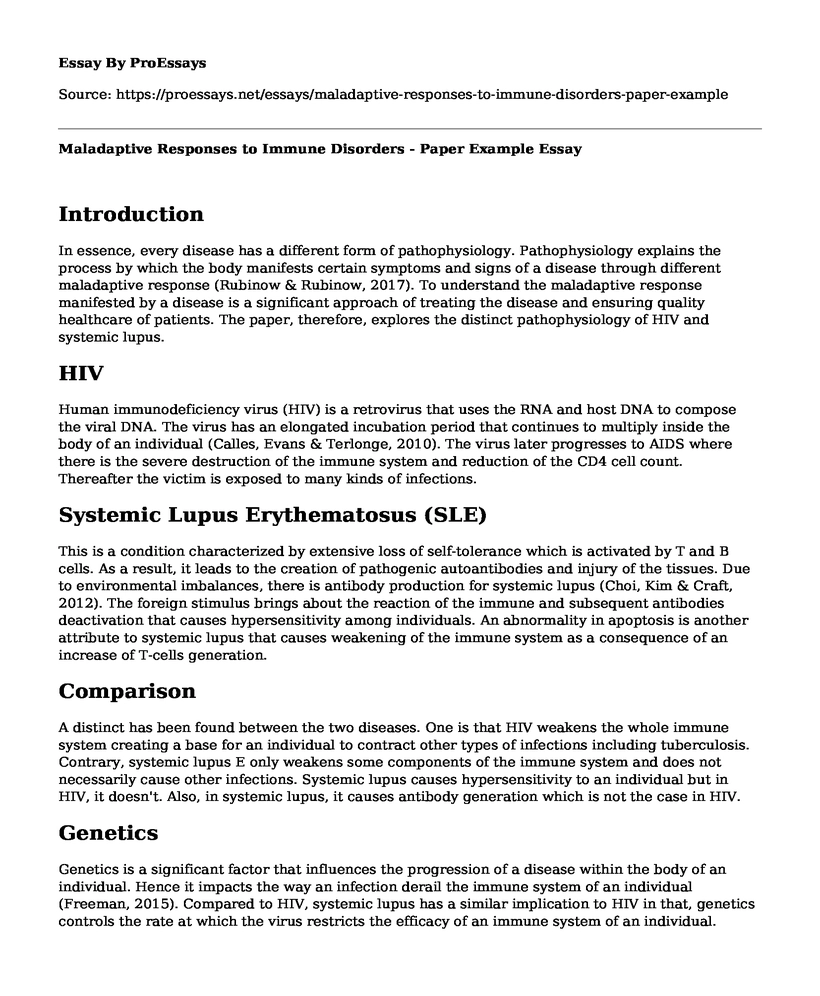Introduction
In essence, every disease has a different form of pathophysiology. Pathophysiology explains the process by which the body manifests certain symptoms and signs of a disease through different maladaptive response (Rubinow & Rubinow, 2017). To understand the maladaptive response manifested by a disease is a significant approach of treating the disease and ensuring quality healthcare of patients. The paper, therefore, explores the distinct pathophysiology of HIV and systemic lupus.
HIV
Human immunodeficiency virus (HIV) is a retrovirus that uses the RNA and host DNA to compose the viral DNA. The virus has an elongated incubation period that continues to multiply inside the body of an individual (Calles, Evans & Terlonge, 2010). The virus later progresses to AIDS where there is the severe destruction of the immune system and reduction of the CD4 cell count. Thereafter the victim is exposed to many kinds of infections.
Systemic Lupus Erythematosus (SLE)
This is a condition characterized by extensive loss of self-tolerance which is activated by T and B cells. As a result, it leads to the creation of pathogenic autoantibodies and injury of the tissues. Due to environmental imbalances, there is antibody production for systemic lupus (Choi, Kim & Craft, 2012). The foreign stimulus brings about the reaction of the immune and subsequent antibodies deactivation that causes hypersensitivity among individuals. An abnormality in apoptosis is another attribute to systemic lupus that causes weakening of the immune system as a consequence of an increase of T-cells generation.
Comparison
A distinct has been found between the two diseases. One is that HIV weakens the whole immune system creating a base for an individual to contract other types of infections including tuberculosis. Contrary, systemic lupus E only weakens some components of the immune system and does not necessarily cause other infections. Systemic lupus causes hypersensitivity to an individual but in HIV, it doesn't. Also, in systemic lupus, it causes antibody generation which is not the case in HIV.
Genetics
Genetics is a significant factor that influences the progression of a disease within the body of an individual. Hence it impacts the way an infection derail the immune system of an individual (Freeman, 2015). Compared to HIV, systemic lupus has a similar implication to HIV in that, genetics controls the rate at which the virus restricts the efficacy of an immune system of an individual.
References
Calles, N. R., Evans, D., & Terlonge, D. (2010). Pathophysiology of the human immunodeficiency virus. HIV Curriculum, 7.
Choi, J., Kim, S. T., & Craft, J. (2012). The pathogenesis of systemic lupus erythematosus-an update. Current opinion in immunology, 24(6), 651-657.
Freeman, A. M. (2015). Pathophysiology: From Genetics to Viruses and More. In Cardiac Sarcoidosis (pp. 5-10). Springer, Cham.
Rubinow, K. B., & Rubinow, D. R. (2017). In immune defense: redefining the role of the immune system in chronic disease. Dialogues in clinical neuroscience, 19(1), 19.
Cite this page
Maladaptive Responses to Immune Disorders - Paper Example. (2022, Jul 25). Retrieved from https://proessays.net/essays/maladaptive-responses-to-immune-disorders-paper-example
If you are the original author of this essay and no longer wish to have it published on the ProEssays website, please click below to request its removal:
- Knowledge Translation in Nursing
- Antibiotic Resistance and Impact on Human Health
- The Scope of Immunization Coverage Essay
- Essay Sample on Patient Education
- Nursing Considerations for Acute & Chronic Asthma in Ethnic Patients - Essay Sample
- Essay Example on NICU Nurses: Exhaustion, Understaffing, & Patient Safety
- Essay Example on Biological Factors in Human Behavior: COVID-19 Impact







